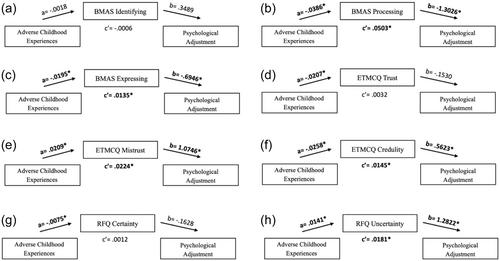Adverse childhood experiences and psychological maladjustment in adolescence: The protective role of epistemic trust, mentalized affectivity, and reflective functioning
Abstract
Introduction
Adverse childhood experiences (ACEs) are psychosocial factors acknowledged as significant contributors to health consequences later in adolescence, including psychological maladjustment. The research suggests that, at a transdiagnostic and transtheoretical level, working on restoring epistemic trust (ET), mentalized affectivity (MA), and reflective functioning (RF) in adolescents with ACEs assumes a central role in the therapeutic process. However, there are still few studies that attempted to investigate the specific role of these sociocognitive factors in the detrimental positive association between levels of experienced ACEs during childhood and psychological maladjustment in nonclinical adolescents.
Methods
A community sample of 306 Italian cisgender adolescents (61.4% assigned females at birth; age range 13–19 years old; Mage = 16.1, SD = 1.64) self-reported ACEs (Childhood Trauma Questionnaire-Short Form), psychological maladjustment (Strengths and Difficulties Questionnaire), ET (Epistemic Trust, Mistrust and Credulity Questionnaire), MA (Brief-Mentalized Affectivity Scale for Adolescence), and RF (Reflective Functioning Questionnaire). A multiple mediation regression analysis has been performed to explore the association between ACEs and psychological maladjustment through the interaction with socio-cognitive factors.
Results
ACEs are positive predictors of psychological maladjustment later in adolescence. Regardless of gender differences, epistemic mistrust and credulity, processing and expressing emotions, and uncertainty about mental states mediated this association, while epistemic trust, identifying emotions, and certainty about mental states did not configure as significant mediators.
Conclusion
Findings suggest that ET disruptions and deficits in RF are risk factors, while MA is a protective factor within the link between ACEs and psychological maladjustment in adolescence. These links help to specify the role of sociocognitive factors in the development of mental problems in adolescents who have been exposed to adverse experiences in childhood.


 求助内容:
求助内容: 应助结果提醒方式:
应助结果提醒方式:


